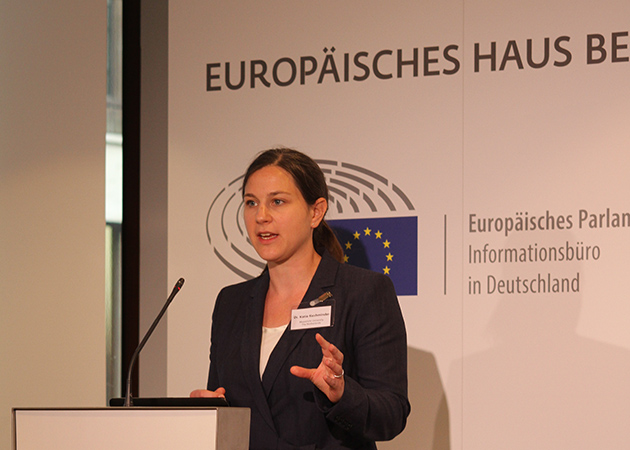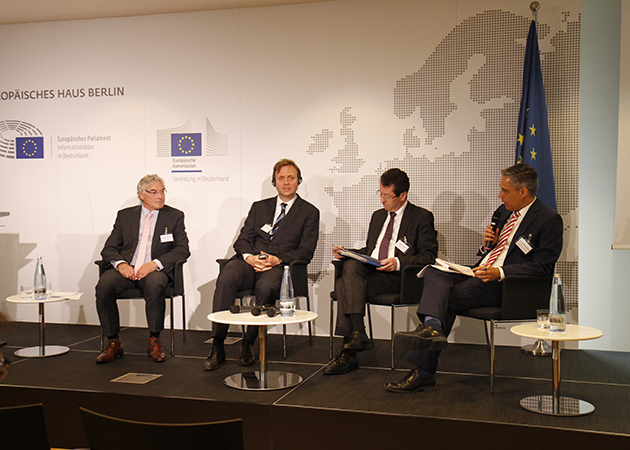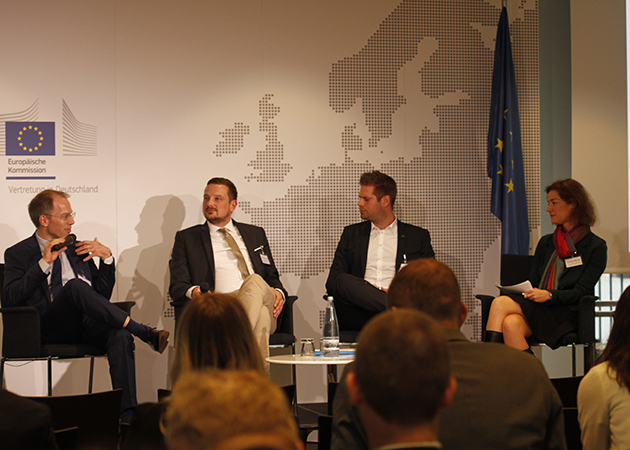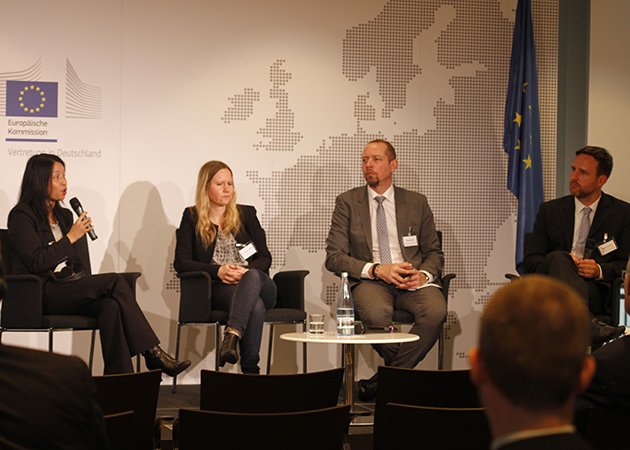Best practice and new methods in return policy , , Return counselling, integrated return management, reintegration
130 experts came together at the invitation of the Federal Office for Migration and Refugees to attend the annual conference of the European Migration Network (EMN) and discuss the challenges of return counselling, return management and reintegration. The conference took place at the beginning of May at the European House at the Brandenburg Gate in Berlin.
 Dr. Katie Kuschminder in her keynote speech
Source: BAMF | L. Thiem
Dr. Katie Kuschminder in her keynote speech
Source: BAMF | L. Thiem
"Particular importance attaches to return, as a central tool for managing migration. The current focus is very much on voluntary return"
, according to the statement by State Secretary Dr. Emily Haber, Federal Ministry of the Interior, in her opening lecture. She stated that close cooperation between all stakeholders at both national and European level was essential in this regard. She had therefore been particularly glad to note that the German National EMN Contact Point at the Federal Office for Migration and Refugees had brought together representatives of the Federation, the Länder, independent institutions and guests from the EMN member states to attend the conference.
Dr. Katie Kuschminder, Research Fellow of the Global Governance Programme at the European University Institute in Florence, then spoke of her research into the connection between sustainable return and reintegration. She stated that the policy debate on sustainable return was too frequently restricted to preventing remigration, thus denying opportunities for the multi-faceted return and reintegration process. Dr. Kuschminder went on to state that, amongst other things, there was a need to agree on a definition of sustainable return.
Best practice: return counselling
On the first panel, representatives from the Saarland, the church-based Diakonie Rheinland-Pfalz social services organisation and the Directorate for Immigration in Norway introduced return counselling projects and their special methods. They discussed the advantages of early counselling, of local counselling structures as against central ones, of close cooperation with NGOs and of the funding granted by the Länder, in addition to the Federation’s voluntary return programmes. Knut Holm from the Directorate for Immigration in Norway stressed the particular importance attaching to individual counselling for asylum-seekers, as well as of providing them with information regarding their status and the situation in the country of origin, when deciding on whether or not to return and opting for assisted return.
 Speakers from left to right: Friedrich Einwich (Diakonisches Werk Trier and Simmern-Trarbach), Knut Holm (Norwegian Directorate for Migration), Horst Finé (Office of Administration of the Saarland) and Chair Dr. Axel Kreienbrink (Research Centre of the Federal Office for Migration and Refugees)
Source: BAMF | L. Thiem
Speakers from left to right: Friedrich Einwich (Diakonisches Werk Trier and Simmern-Trarbach), Knut Holm (Norwegian Directorate for Migration), Horst Finé (Office of Administration of the Saarland) and Chair Dr. Axel Kreienbrink (Research Centre of the Federal Office for Migration and Refugees)
Source: BAMF | L. Thiem
Integrated return management: a critical outlook
Representatives of the BAMF, the European Commission and the Swiss State Secretariat for Migration took a critical look at the status quo in integrated return management on the second panel. Measures for voluntary return and forced removal, as well as reintegration, are interlinked. Dr. Patrick Schmidtke, Head of Division on Return at the Federal Office for Migration and Refugees, spoke of Germany’s latest return programme Initial aidPlus, and presented two new information services: a nationwide return hotline and the "Returning from Germany" web portal (www.ReturningfromGermany.de). Both information services are intended to make it easier for those concerned as well as volunteers to access information and obtain an overview of the parallel return programmes that are operated by local authorities, Federal Länder and the Federation. This was said not to be simple for experts, "so how difficult must it be for someone who is thinking about returning, but is unable to understand German"
recalled Dr. Schmidtke.
Dan Rotenberg, Deputy Head of Unit for Irregular Migration and Return Policy at the European Commission, called in his lecture for a re-think, given the 2.6 million asylum applicants who had come to the EU in the past two years, roughly one million of whom have to return to their countries of origin. This had been the purpose of concluding the renewed EU Action Plan on Return and recommendations to make return procedures more effective, which had been adopted in March 2017. "We need faster procedures, a multidimensional approach and better coordination, both in and between the Member States"
, said Rotenberg. He also criticised the frequent lack of willingness to cooperate on the part of the countries of origin to which returnees were to return.
Roger Steiner, State Secretary for Migration from Switzerland, emphasised in turn that voluntary return and the consistent enforcement of deportations belonged together, given that the latter was also an incentive to opt for assisted voluntary return.
 Speakers from left to right: Dan Rotenberg (European Commission), Dr. Patrick Schmidtke (Federal Office for Migration and Refugees - Return Division), Roger Steiner (State Secretariat for Migration of Switzerland) and Chair Corinna Wicher (Federal Office for Migration and Refugees - Directorate for International Tasks)
Source: BAMF | L. Thiem
Speakers from left to right: Dan Rotenberg (European Commission), Dr. Patrick Schmidtke (Federal Office for Migration and Refugees - Return Division), Roger Steiner (State Secretariat for Migration of Switzerland) and Chair Corinna Wicher (Federal Office for Migration and Refugees - Directorate for International Tasks)
Source: BAMF | L. Thiem
Reintegration for sustainable return
The EMN conference closed with a panel on reintegration. Taking as an example a return project to Vietnam organised by the Federal Länder Berlin and Brandenburg, Dr. Sarah Tietze from the International Organisation for Migration (IOM) showed how reintegration and sustainable return to the country of origin can succeed. Central factors were said to include individual counselling in advance, including for relatives in the country of origin as well as NGOs. She also regretted the fact that some tried-and-tested reintegration programmes were no longer being supported by the local authorities and Federal Länder since the programmes of the European Reintegration Network (ERIN) had been introduced, and pointed out: "The reintegration programmes are positively complemented by ERIN, but it is no replacement."
Po-Ling Ho from the Dutch Ministry of Security and Justice provided an insight into the work of ERIN. ERIN is chaired by the Netherlands, and involves 17 EU Member States and Australia, as well as 20 third countries such as Afghanistan, Iraq, Morocco and Somalia, as well as local NGOs, the IOM and Caritas. The target is to remove double structures in the countries involved. In the Member States, returnees are advised on the return and reintegration process. The goal is said to be to make it easier for them to gain access to education or to the labour market on their return to their countries of origin.
Peter Bonin from the Migration and Development sectoral project of the Deutsche Gesellschaft für Internationale Zusammenarbeit (GIZ) development cooperation organisation closed the panel with a lecture on development-orientated and development-sensitive reintegration. He stated that the large number of displaced persons and unsuccessful asylum applicants had also lent a fresh dynamic to return policy within German development cooperation: Whilst previously it had focussed on the highly-qualified, in fact individuals who were obliged to depart, some of whom were being forcibly removed and were unwilling to leave voluntarily, had emerged as a new prime target group. This fact was said to pose new challenges for return programmes within development cooperation. Bonin illustrated this using the example of the new programme entitled "Prospects at Home", which is being carried out in cooperation between the Federal Ministry for Economic Cooperation and Development and the Federal Ministry of the Interior.
 Speakers from left to right: Po-Ling Ho (Dutch Ministry of Security and Justice), Dr. Sarah Tietze (IOM), Peter Bonin (GIZ) and Chair Janne Grote (EMN National Contact Point)
Source: BAMF | L. Thiem
Speakers from left to right: Po-Ling Ho (Dutch Ministry of Security and Justice), Dr. Sarah Tietze (IOM), Peter Bonin (GIZ) and Chair Janne Grote (EMN National Contact Point)
Source: BAMF | L. Thiem
The EMN's annual conference made it clear how vital it is with regard to return to have intensive counselling, good monitoring through research, a holistic view of individual and structural influencing factors, including in the countries of origin, and close cooperation between all stakeholders within Germany and Europe, as well as with returnees' countries of origin, in order to enable people to return in dignity and facilitate reintegration in the countries of origin.
